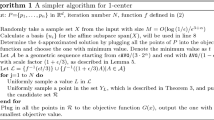Abstract
The problem of truth discovery arises in many areas such as database, data mining, data crowdsourcing and machine learning. It seeks trustworthy information from possibly conflicting data provided by multiple sources. Due to its practical importance, the problem has been studied extensively in recent years. Two competing models were proposed for truth discovery, weight-based model and probabilistic model. While \((1+\epsilon )\)-approximations have already been obtained for the weight-based model, no quality guaranteed solution has been discovered yet for the probabilistic model. In this paper, we focus on the probabilistic model and formulate it as a geometric optimization problem. Based on a sampling technique and a few other ideas, we achieve the first \((1 + \epsilon )\)-approximation solution. The general technique we developed has the potential to be used to solve other geometric optimization problems.
The research of the first author was supported in part by NSF grants CCF-1566356 and CCF-1717134. The research of the last two authors was supported in part by NSF through grants CCF-1422324, IIS-1422591, and CCF-1716400.
Access this chapter
Tax calculation will be finalised at checkout
Purchases are for personal use only
Similar content being viewed by others
Notes
- 1.
For categorical data, the Gaussian distribution may cause fractional answers, which can be viewed as a probability distribution over possible truths. In practice, variance for different coordinates of the truth vector may be different and there might be some non-zero covariance between different coordinates; however, up to a linear transformation, we may assume the covariance matrix is \(\sigma _i^2 I_d\).
- 2.
Also referred as polynomial growing function or Log-Log Lipschitz function in literature.
References
Bādoiu, M., Har-Peled, S., Indyk, P.: Approximate clustering via core-sets. In: Proceedings of the Thiry-Fourth Annual ACM Symposium on Theory of Computing, pp. 250–257. ACM (2002)
Ding, H., Gao, J., Xu, J.: Finding global optimum for truth discovery: entropy based geometric variance. In: LIPIcs-Leibniz International Proceedings in Informatics, vol. 51. Schloss Dagstuhl-Leibniz-Zentrum fuer Informatik (2016)
Dong, X., Gabrilovich, E., Heitz, G., Horn, W., Lao, N., Murphy, K., Strohmann, T., Sun, S., Zhang, W.: Knowledge vault: a web-scale approach to probabilistic knowledge fusion. In: Proceedings of the 20th ACM SIGKDD International Conference on Knowledge Discovery and Data Mining, pp. 601–610. ACM (2014)
Dong, X.L., Berti-Equille, L., Srivastava, D.: Integrating conflicting data: the role of source dependence. Proc. VLDB Endow. 2(1), 550–561 (2009)
Dong, X.L., Berti-Equille, L., Srivastava, D.: Truth discovery and copying detection in a dynamic world. Proc. VLDB Endow. 2(1), 562–573 (2009)
Feldman, D., Langberg, M.: A unified framework for approximating and clustering data. In: Proceedings of the Forty-Third Annual ACM Symposium on Theory of Computing, pp. 569–578. ACM (2011)
Galland, A., Abiteboul, S., Marian, A., Senellart, P.: Corroborating information from disagreeing views. In: Proceedings of the Third ACM International Conference on Web Search and Data Mining, pp. 131–140. ACM (2010)
Kumar, A., Sabharwal, Y., Sen, S.: Linear time algorithms for clustering problems in any dimensions. In: Caires, L., Italiano, G.F., Monteiro, L., Palamidessi, C., Yung, M. (eds.) ICALP 2005. LNCS, vol. 3580, pp. 1374–1385. Springer, Heidelberg (2005). https://doi.org/10.1007/11523468_111
Li, F., Lee, M.L., Hsu, W.: Entity profiling with varying source reliabilities. In: Proceedings of the 20th ACM SIGKDD International Conference on Knowledge Discovery and Data Mining, pp. 1146–1155. ACM (2014)
Li, Q., Li, Y., Gao, J., Zhao, B., Fan, W., Han, J.: Resolving conflicts in heterogeneous data by truth discovery and source reliability estimation. In: Proceedings of the 2014 ACM SIGMOD International Conference on Management of Data, pp. 1187–1198. ACM (2014)
Pasternack, J., Roth, D.: Knowing what to believe (when you already know something). In: Proceedings of the 23rd International Conference on Computational Linguistics, pp. 877–885. Association for Computational Linguistics (2010)
Welinder, P., Branson, S., Belongie, S.J., Perona, P.: The multidimensional wisdom of crowds. NIPS 23, 2424–2432 (2010)
Whitehill, J., Wu, T.-F., Bergsma, J., Movellan, J.R., Ruvolo, P.L.: Whose vote should count more: optimal integration of labels from labelers of unknown expertise. In: Advances in Neural Information Processing Systems, pp. 2035–2043 (2009)
Xiao, H., Gao, J., Li, Q., Ma, F., Su, L., Feng, Y., Zhang, A.: Towards confidence in the truth: a bootstrapping based truth discovery approach. In: Proceedings of the 22nd ACM SIGKDD International Conference on Knowledge Discovery and Data Mining, pp. 1935–1944. ACM (2016)
Xiao, H., Gao, J., Wang, Z., Wang, S., Su, L., Liu, H.: A truth discovery approach with theoretical guarantee. In: Proceedings of the 22nd ACM SIGKDD International Conference on Knowledge Discovery and Data Mining, pp. 1925–1934. ACM (2016)
Yin, X., Han, J., Philip, S.Y.: Truth discovery with multiple conflicting information providers on the web. IEEE Trans. Knowl. Data Eng. 20(6), 796–808 (2008)
Zhao, B., Han, J.: A probabilistic model for estimating real-valued truth from conflicting sources. In: Proceedings of QDB (2012)
Zhao, B., Rubinstein, B.I., Gemmell, J., Han, J.: A bayesian approach to discovering truth from conflicting sources for data integration. Proc. VLDB Endow. 5(6), 550–561 (2012)
Huang, Z., Ding, H., Xu, J.: Faster algorithm for truth discovery via range cover. Algorithms and Data Structures. LNCS, vol. 10389, pp. 461–472. Springer, Cham (2017). https://doi.org/10.1007/978-3-319-62127-2_39
Author information
Authors and Affiliations
Corresponding author
Editor information
Editors and Affiliations
Rights and permissions
Copyright information
© 2018 Springer International Publishing AG, part of Springer Nature
About this paper
Cite this paper
Li, S., Xu, J., Ye, M. (2018). Approximating Global Optimum for Probabilistic Truth Discovery. In: Wang, L., Zhu, D. (eds) Computing and Combinatorics. COCOON 2018. Lecture Notes in Computer Science(), vol 10976. Springer, Cham. https://doi.org/10.1007/978-3-319-94776-1_9
Download citation
DOI: https://doi.org/10.1007/978-3-319-94776-1_9
Published:
Publisher Name: Springer, Cham
Print ISBN: 978-3-319-94775-4
Online ISBN: 978-3-319-94776-1
eBook Packages: Computer ScienceComputer Science (R0)




